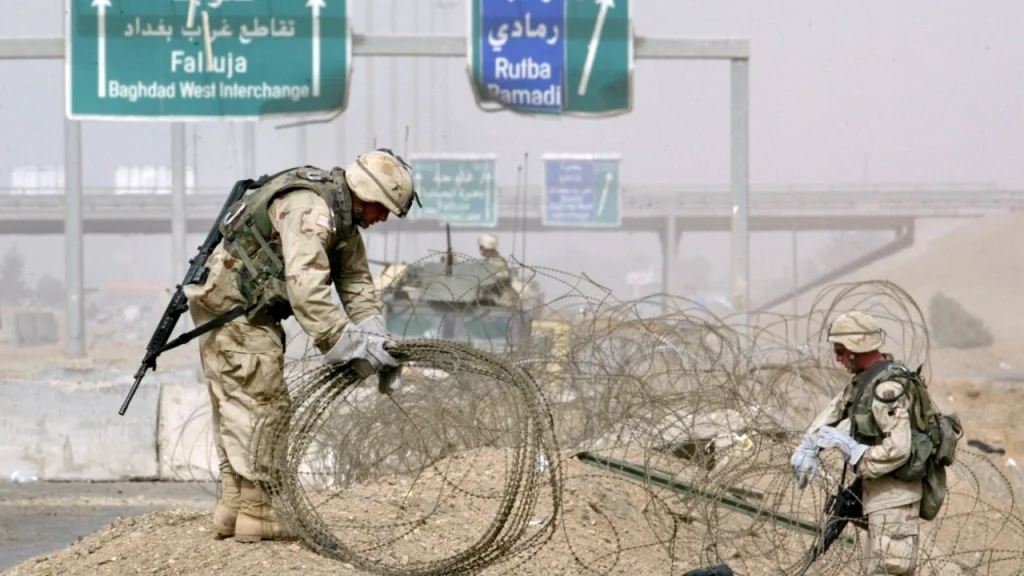The War in Iraq: 20 Years Later Told by Iraqi-Americans

By Yaara Aleissa / Arab America Contributing Writer
In the Netherlands airport, the TVs projected CNN. Everyone centered around the airport screens watching a clip of U.S. troops arriving on Iraqi soil. The video transitioned into a picture of Saddam Hussien. As the Dutch reporters translated the news the only comprehensible words to the Iraqi native were “Troop”, “Iraq”, and “United States” but it was enough to know what had happened. The United States had finally entered Iraq.
This is the story recalled by an Iraqi woman, who has chosen to remain anonymous. She received her visa to enter the United States on March 19th, the day before United States troops entered Iraq. However, a year before, she had already left the country. She was living in Amman while her visa was being sorted to relocate to the United States where her husband lived.
The news did not come as a surprise to her. There had been signs that she described as evident to Iraq being the “next target”. She had already accepted her country’s fate. The United States had already invaded Afghanistan following the aftermath of 9/11.
“In Afghanistan, they blamed Osama Bin Laden but in Iraq, there was no Osama Bin Laden,” she expressed.
However, there was a Saddam Hussien, who ruled over Iraq in a dictatorship for 24 years. The father of the Iraqi woman grew up in this dictatorship, got married, and had kids under this dictatorship. Throughout this one thing stayed the same, the restraint of free speech.
The dictatorship of Saddam Hussien led to the Ba’ath Party which maintained power through their harsh treatment of Kurds and Shia Muslims. The father recalled seeing members of the party in the neighborhood where they lived. Identifying the militia group by their olive green uniforms. The color was a sign of silence out of fear of being a victim of their treatment against those that spoke critically of the dictator.
Opposing the Ba’ath Party was the Mahdi Army, known more commonly as Jaysh Al-Mahdi. This group started as a voice for Shia Muslims silenced by the Ba’ath party. However, it quickly became a militia group. They would kill anyone that would voice opposing opinions, assuming they were working for the American Army.
The Ba’ath party and Mahdi Army were one example of Iraqis retaliating against each other and the presence of these groups only further fueled this. Citizens broke into their respective sides which more deeply fueled a history of Sunni-Shia conflicts.
However, one silencer among the groups was the presence of American troops. The father recalled fights that would break out. Just as quickly they would dissolve by the interference of American troops. The father and daughter agreed that the United States was an authoritative figure in Iraq.
“Without the United States, Saddam Hussien would have lived and continued to rule. He was not afraid of war. He would die before saying no” the father asserted.
The killing of Saddam Hussien and the end to his dictatorship stands as the only positive outcome they recalled from the invasion. While they believed the United States was the only country capable of taking down the dictator, frustration came from how long it took.
The husband of the Iraqi woman saw the invasion from a different perspective and focused more on what it meant to the regime and less on the killing of Saddam Hussien. After trying to recover from the Gulf War, a time when Iraqis experienced many hardships, the regime in Iraq wanted to build a country on empowerment.
Living in the United States since 1996, the Iraqi woman’s husband provided a perspective centered on the reactions of American natives. One memory, in particular, stood out, embedded in memory. He was in a New York bar where the U.S. strike on Erbil during the Gulf War broke news. People in the bar cheered as if it was a winning goal for their favorite sports team. He sat there, mixed with emotions.
“I was very sad because this is not the way…I got so mad, they were killing innocent people but you [United States] always talked about your intelligence that can chase everyone but not Saddam Hussien?” the husband recalled.
Throughout the news, his priority was the people. Saddam Hussien to him was a ruthless dictator and under his presence, Iraqis were still being harmed. Yet, after his killing, this didn’t end.
The husband and wife went to visit family in Iraq in 2004 with their newborn daughter. Despite the tragedies occurring they celebrated the first grandchild in the family.
In Baghdad, the wife recalled the streets of her childhood home as nothing as she had seen before. The streets were lined with people laying on the floor with their hands tied. American tanks took up the streets. There were checkpoints to enter each neighborhood. The fact her husband spoke English made their interactions much shorter but that was guaranteed for all Iraqis.
Overall, they are thankful that their experience with American troops was cooperative on both ends. The father described a moment when an American troop came to search their home. At the time they had their daughter’s gold dowry for her wedding in the bedroom. The father feared how American troops would view this. Luckily, they were able to share this with the translator and no conflicts arose.
Today, the family lives together in the United States. They expressed much gratitude to a country that provides them access to resources such as healthcare, freedom of speech, job stability, and so much more. They acknowledge the growth of Iraq from dictatorship to democracy but it is still not a place to live. When they left they sold everything but kept in mind that if things didn’t work out in the United States they may have to head back home. Luckily, they feel they have built a sense of community here. Yet, they still cannot deny the roots that tie them back home.
Check out the Arab America Blog here!









